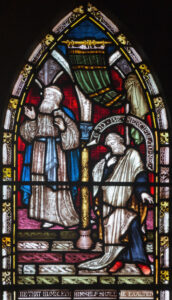The Foundation of Our Assurance
There are Christians who seem to live a kind of sun-filled Christian life. They never appear to encounter anything that challenges their assurance of salvation; nothing that disturbs them or their assurance. But others struggle to recognize the tell-tale signs of genuine Christianity in their lives. For most of us, we know there are going to be obstacles and disturbances as we seek to become more Christ-like. “We always need to be prepared for the way in which Satan seeks to spoil our assurance.”
Sinclair Ferguson observed this was what Satan always tries to do. “He knows he cannot destroy our salvation.” But he does everything he possibly can to destroy our enjoyment of salvation. Part of our enjoyment of salvation is knowing that we are truly the Lord’s, that we are really saved. So, in the video, “Hindrances Strew All the Way,” Ferguson invited us to think about a number of possible hindrances that could be obstacles to our enjoyment of salvation.
Sometimes we have a tendency to confuse the foundation of our salvation in justification with the super-structure of that salvation. “If we don’t understand that justification is complete, then in our Christian life, we’re likely to try to add to our justification, or complete our justification.” If that is true, we will not be able to enjoy our justification, because we don’t believe it is really complete enough. Justification is complete when we come to faith in Jesus Christ. “No degree of sanctification will add to your justification.”
If you try to rebuild the foundation of justification by adding to it, you will destroy the assurance you have.
A second thing that can hinder our assurance is inconsistent obedience. If we live in a way that is inconsistent with the gospel, then we’re not far from wondering whether the gospel is really ours.
There is a third hindrance to assurance that is a serious misunderstanding of affliction and suffering. “God promised me blessings, and look at what’s happening to me. How can I be sure of my salvation?” Ferguson said we need realize the problem may be deeper than it first seems. Many Christians are sure God loves them because of the blessings they experience.
“If you base your assurance on the providences of God rather than on the promises of God, when the providences of God become difficult for you, you’re bound to lose your sense of His love.” The first remedy is to understand that our persuasion of God’s love is based on the cross of Christ, not on His providences. God showed His love for us in that while we were still sinners, Christ died for us (Romans 5:8), not that He showed His love by giving us many blessings. “So, we don’t find our assurance of our salvation in the blessings that God gives to us.”
Sometimes those blessings come to us in very dark parcels, according to Ferguson. God fulfills many purposes in our lives through suffering, not blessing. Christians need to understand “that sufferings produce character.” If God never disciplined us, it would raise the question of whether we were illegitimate children and not sons (Hebrews 12:8).
So, because we are sinners, of course there are going to be things God does in our lives that grate upon us, because He’s transforming our lives and our wills to conform to His character and His will.
Ferguson makes a point here about affliction that I’ve long seen with recovering alcoholics and addicts. Sometimes God uses afflictions in our lives to prepare us for future service to others. “The day will probably come when you look back on this experience and this hardship and say, ‘Oh, I think I understand now part of why that came into my life, because it’s enabled me to minister to somebody else.’” Now that you’ve walked a little further in the aftermath of your personal affliction, you can help another person understand how things will go; that they can get through it.
Even if I can’t say exactly what God is doing at this point in my life, when I’m struggling with affliction, or suffering, or disappointment, I know the kinds of things He is doing, and I realize everything He is doing, as Paul says in Romans 8, is working together for the good of those who love Him.
That good Paul referred to is to conform us to the likeness of His Son, that He might be the firstborn among many (Romans 8:29). So, when you go through affliction, don’t say, “He doesn’t love me any longer.” Because now we understand He demonstrated His love towards us in that while we were still sinners, He died for the ungodly. “And there I rest, and in that light, I know that whatever afflictions I may go through are part of His purposes to make me more like Jesus.” Rather than diminishing the sense of His love and oujr assurance of his salvation, they minister to it.
The fourth hindrance to assurance is a misunderstanding of what union with Christ does and doesn’t do. When there has been a sudden, radical transformation in a person’s life, there can be a tendency to think this is what the Christian life is like—overcoming sin is easy. There is a tremendous transformation, and “it’s almost as though it’s easy to deal with sin.” We don’t realize that the Lord has been carrying us, His lambs in His bosom (Isaiah 40:11). Then at some point He says, “You’re going to have to learn to walk the walk.”
There are lots of obstacles as you walk the walk. And the danger arises that you can become prey to others who will say, “Now, are you feeling a bit disappointed with your Christian life? Here is the plan . . . Here is the method, and it will raise you above all the struggle, and you will have fullness of life.” If you are really united to Christ, then you will be delivered from the struggle. This is the very opposite of Paul’s teaching, who says the reason for the struggle is because you have been united to Christ.
Something similar is said about the Holy Spirit, “If you were just filled with the Holy Spirit, all those struggles in the Christian life would go.” Again, Paul counters by in effect saying: “I wouldn’t have any of those struggles were it not for the presence of the Holy Spirit! It’s precisely because the Holy Spirit has come to indwell me that the struggles have begun.” Young Christians will often say that since becoming a Christian life has become more difficult. “If we think union with Christ is the way to be delivered from challenges, difficulties, struggles with indwelling sin, then we haven’t really understood what union with Christ does.”
It transforms our lives and puts us into the battle; the battle with the Devil. Remember that the Devil cannot destroy your salvation, so he will try to destroy your assurance of salvation. In The Institutes of the Christian Religion, John Calvin said: “Satan’s aim is to drive the saint to madness by despair.” Satan wants to make the Christian believer so ashamed of their spiritual condition that they will despair of their salvation.
I cannot say to Satan, “I’m not as bad as that.” The truth may be that I am worse than that. But I am able to say to him along with John Newton, “Although I’m bowed down with a load of sin, by Satan sorely pressed, I may my fierce accuser face, and tell him, ‘Christ has died’” (from the hymn, “Approach, My Soul, the Mercy Seat,” by John Newton). It takes us back to Jesus Christ, the foundation of all our assurance.
This article has been based on the 12th and final video in Sinclair Ferguson’s teaching series, The Whole Christ, from Ligonier Connect. Here is a link to Ligonier Connect. The video series is itself based upon his book of the same name. You can review summaries of the Marrow Controversy here and here. If the topic interests you, look for more of my ruminations under the link, The Whole Christ.














